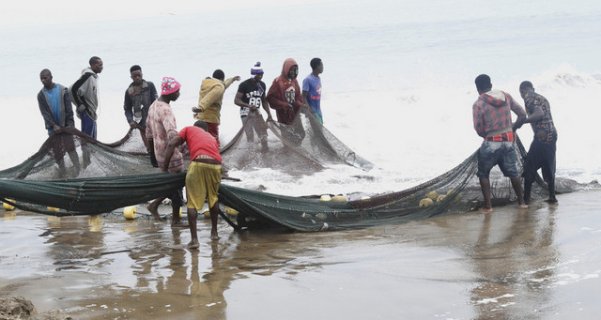The town, 15 kilometres from Sumbe, capital of the province of Kwanza Sul, spreads out over a bay that makes it ideal for receiving fisheries, mainly from artisanal fishing.
Although Sumbe is the country's main supplier of fish these days, today there are almost as many "boras" (small boats) on land as at sea.
"The fish isn't coming", Virgínia Miguel, 35, one of the women who gather near the beach and buy fish for resale in the nearest squares, explains.
In addition to the shortage of fish, the recent ban on catching "fine sardines, because they're too small", she explains.
"Meanwhile, we're dying", resigns Maria Miguel, 42, who attributes the lack of fish to the lunar cycle.
But there are also those who justify the reduction in activity due to the high cost of the means of production.
"Everything's expensive - the line, the nets, the hook box", one of the fishermen on land comments indignantly.
The fish market is also empty. The stone benches have no traces of scales and you can't even smell the characteristic smell of this type of space, which in this case doesn't seem to have much use. But no one knows - or means - when fish were last landed here.
Vasco Januário, 30, joined his friends, taking advantage of the shade of a tree as a refuge from the intense sun, while he waited for clients to take on his motorbike. He's a fisherman, but when "he's weak on fish" doing taxi service is the only alternative that allows him to get some money.
"There are fishermen leaving the activity and going into agriculture," confirms Eugénio Lunga, head of the Sumbe Artisanal Fishing Institute, which brings together 15 fishing communities, including Quicombo, between the Queve and Benguela rivers, a total of around four thousand fishermen.
"Sumbe is today the largest supplier of fish in the country. This is one of the richest areas of fish in terms of variety and quality because it catches the great ornament of the cold Beguela current, making the whole seafront have some of the most diverse species", he stresses, adding that Quicombo is "famous for its fish".
They usually leave Sumbe between 15 and 20 vans a day for Luanda, but at the moment "there's a shortage of product", he adds.
Fishing would be a much more profitable activity with bigger boats, instead of being limited to the traditional "boras".
"We have heard many complaints. The activity has low profitability because acquiring the means is expensive and the cost of living is expensive. For example, if an engine breaks down they can't repair it", he says.
There's also a lack of monitoring means to detect shoals, and in times of scarcity, "riddle-fishing" doesn't help, he comments.
Monitoring is also present, and sometimes there are "some upsets", such as illegal fishing due to the immaturity of the species, reports fisheries inspector Eusébio Correia.
In addition to monitoring licences, inspectors check that the fish is of the appropriate size and is in a condition to be sold.
But the authorities do not have it easy. Access to Quicombo is difficult and requires 15 kilometres of bumpy and dusty road.
"We have no means of travel of our own, nor nautical means. There was a fibre boat, but it's broken down," Eusébio Correia tells us.
There are improvement projects, including the upgrading of the centre's facilities, supported by the African Development Bank, the promotion of microcredit for small businesses and training in fish processing, aimed at women, but despite having some decision-making autonomy, the institute is financially dependent on Luanda.
Navita Ngolo, second vice-president of the parliamentary group of the National Union for the Total Independence of Angola, who visited this Thursday the venue as part of the party's IX Parliamentary Days, considers that "people are thrown to their own devices" and stresses that fishing and agriculture are "fundamental" for the country's development.
"We cannot have programmes only on paper. We have to create the conditions for integrated development," he told Lusa.
She said the institute was "dormant" and needed to be rehabilitated, which would make life easier for fishermen, but especially for women working in fish processing.
It would also help to increase the distribution of fish, a "cheaper and healthier food" with benefits for the general population.
"Quicombo is a location favoured by nature in terms of fish, but it is necessary to invest in infrastructure that allows the docking of large boats," he suggested.
Other measures to be adopted would be the promotion of cooperatives and support for the purchase of boats, he said.







